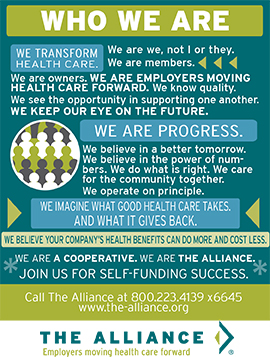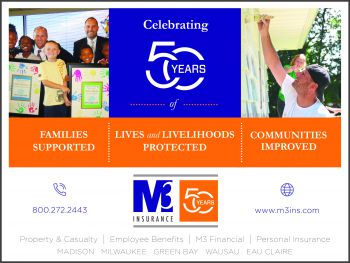June 2018 |
HR InTouchThe Monthly Newsletter of the Greater Madison Area SHRM |
||||||||||||||||||||||||||||||||||||||||||||||||||||||||
In This EditionPresident's Message Government Affairs & Legal Updates
Professional Development The Role of Human Resources in Battling Opioid Addiction A Telecommuter’s 7 Musts SHRM National Diversity & Inclusion Job Fair GMA SHRM Media Relations GMA SHRM – A Retention Tool?
Greet, Meet and Eat - Networking Lunch Using WisConnect - Internship Opportunities GMA SHRM Member News Welcome New Members!
|
Greetings GMA SHRM Members –
Tammy Wacek will be taking over as President on July 1 and you will be in excellent hands. We’ve worked closely together on the board and she will fearlessly lead our chapter in the coming year. Government Affairs & Legal Updates
|
||||||||||||||||||||||||||||||||||||||||||||||||||||||||
| 2018 | 2019 | Change | |
|---|---|---|---|
| HSA contribution limit (employer + employee) | Self-only: $3,450 Family: $6,900 |
Self-only: $3,500 Family: $7,000 |
Self-only: +$50 Family: +$100 |
| HSA catch-up contributions (age 55 or older) | $1,000 | $1,000 | No change |
| HDHP minimum deductibles | Self-only: $1,350 Family: $2,700 |
Self-only: $1,350 Family: $2,700 |
No change No change |
| HDHP maximum out-of-pocket amounts (deductibles, co-payments and other amounts, but not premiums) | Self-only: $6,650 Family: $13,300 |
Self-only: $6,750 Family: $13,500 |
Self-only: +$100 Family: +$200 |
Fair Labor Standards Act (FLSA) Update
 Submitted by: Jeff Palkowski, Director of Government Affairs GMA SHRM and SHRM Advocacy Captain (Wisconsin 1st CD
Submitted by: Jeff Palkowski, Director of Government Affairs GMA SHRM and SHRM Advocacy Captain (Wisconsin 1st CD
Those of you wondering when we may finally see a resolution to the Fair Labor Standards Act (FLSA) overtime exemption rule updates that were “put on hold” in 2016 may have to wait a bit longer. The U.S. Department of Labor Wage and Hour Division had most recently planned to issue a proposed rule sometime this fall but the DOL is now estimating that the earliest that we may see the proposed update, and new salary threshold, may be January 2019.
A Notice of Proposed Rulemaking issued by the DOL would likely announce an updated salary threshold and allow for public comments prior to implementation. A January 2019 date may still potentially be delayed as Secretary of Labor Alexander Acosta continues to build his team, some of which still await Senate confirmation.
What will the new threshold look like? Secretary Acosta remarked last year that the $23,660 threshold “certainly needs to be updated”, but it is unlikely that the new threshold would be near the previously proposed threshold of $47,476. Some experts are estimating a new threshold between $30,000 and $40,000.
As employers and other stakeholders await the proposal, it would be prudent to dust off the processes and exercises that many employers implemented in anticipation of the previously proposed threshold increase and prepare for similar action if the new threshold is enacted, likely in 2020 based upon the current timeline.
Return to Top
2019 Day on the Hill Dates Set
Submitted by: Jeff Palkowski, SHRM-CP, SHRM Advocacy Captain for Wisconsin’s 1st Congressional District, Director of Government Affairs for Greater Madison Area SHRM
(Reprint from SHRM Policy Action Center – 3/6/18)
The 5th Annual WI SHRM Day on the Hill event in 2019 have been set. Current plans call for the full-day event to be held on Thursday, February 14, 2019 (yes, Valentine’s Day) at the Park Hotel and Wisconsin State Capitol here in Madison. An evening networking reception at the Park Hotel would be held the evening before the event on Wednesday, February 13, 2019.
If you have not attended a previous Day on the Hill, you should consider this unique opportunity hosted in Madison. The day typically features speakers addressing current legislative issues and employment law updates followed by scheduled meeting with state legislators to discuss current state legislation that impact human resources. To read a summary of this year’s event, visit the SHRM Action Policy Center.
More information about the event, including registration information, when available can be found on the WI SHRM State Council webpage: www.wishrm.org
Return to Top
Professional Development
The Role of Human Resources in Battling Opioid Addiction
Submitted by: Brian Goodman, Attorney with Boardman & Clark LLP
| Are you looking to understand the employment laws applicable to employees struggling with opioid abuse, looking for a way to address the needs of your current employees and their families, and looking a way to help the Madison Police Department interrupt the cycle of addiction in our community? |
If so, you want to be sure to attend GMA SHRM’s Professional Development Summit on September 18, 2018:
“The Legal and Practical Impact of the Opioid Crisis on the Workplace”.
Did you know?
“The cost of treating opioid addiction among American workers and their families has skyrocketed in recent years.” (Kaiser Family Foundation)
"As employers, you already understand that the health of your employees has an impact on your bottom line. My challenge to you is to think about how you can impact health beyond the walls of your office, beyond the factory." (Surgeon General Jerome Adams)
“Madison, like many other cities, has seen alarming rates of heroin overdoses and deaths. In 2016, MPD responded to 143 known overdoses and 9 deaths. In 2017, this number rose to 259 overdoses and 34 deaths. Year-to-date (January and February 2018) we are aware of 34 known overdoses and 5 deaths.” (Chief Mike Koval, Madison Police Chief)
“People covered by employer health insurance received $2.6 billion worth of treatment for opioid addiction and overdoses in 2016, up from $273 million in 2004. Some $2.3 billion was covered by insurance, while patients shelled out $335 million. Just over half the spending was for the treatment of workers' children, while just under a third were for the employee themselves. The rest covered spouses' treatment.” (Kaiser Family Foundation)
The opioid crisis provides a myriad of challenging legal and practical dilemmas for HR professionals. Failing to understand the law in this area could result in lawsuits, damage to workplace morale, and the loss of potentially viable employees and applicants.
This important session will be presented by Brian Goodman, attorney with Boardman & Clark and representatives of the Madison Police Department.
Brian Goodman will analyze the challenging legal issues presented at each crucial stage of the employment “life cycle” and provide key strategies for navigating safely through the legal labyrinth surrounding these issues.
Then, representatives from the Madison Police Department will present information on the Madison Addiction Recovery Initiative (MARI program) that strives to provide quicker access to treatment to people addicted to opiates who are committing low-level property crimes and who may have simple possession charges. They will also discuss opiate abuse statistics in the Madison area and how it impacts employers at all levels.
What you will learn:
- The applicability of employment laws to the opioid epidemic including disability, medical leave, and arrest and conviction discrimination laws.
- The difference in state and federal law regarding accommodating employees suffering from drug abuse issues, including the interaction of the FMLA with state and federal disability discrimination laws.
- The extent to which opioid addiction impacts the lives of employees, businesses, and the community.
- The community resources, programs, options, and tools for helping employees facing addiction issues.
Find more information or register now for this PDS on September 18!
Return to Top
A Telecommuter’s 7 Musts
Submitted by: Clara Tavarez, Media Relations Committee, GMA SHRM and Madison Area Manager, Futura Language Professionals
Data collected by Global Workplace Analytics reveals that regular work-at-home (half-time or greater), among the non-self-employed population in U.S., has grown by 115% from 2005-2015. While there is no doubt in my mind that telecommuting is not for everyone, I am a big advocate for this shift as it was a top consideration for my latest career move. Having successfully transitioned to an environment where 75% of my work is remote (including managing remote workers), and coming from workplaces where some work-from home has always been an option over the past 12 years, has helped me come up with a list of ‘must haves’ to make my permanent work-from-home transition successful. Below you’ll find my 7 ‘Musts’ for the remote worker. Any HR Manager overseeing remote employees should also consider these ‘7 musts’. Some of these may resonate with you from your own experience or, may be worth exploring if you are currently considering this option at work.
- A skilled manager – This one goes first. The rest are in no specific order. A good manager, meaning a great communicator, someone who sets a good example, and is caring, makes all of the difference. Questions to ponder from HR/management perspective: Do you trust the manager’s hiring decision when it comes to selecting workers who really represent your company’s culture no matter where they are? Does the manager of your remote worker communicate clearly? Is he or she capable of training your person on best telecommuting practices? Is the manager a good team builder?
My current manager is outstanding at communicating what needs to happen, by when, and even how, if necessary.My manager passed on her own best practices in getting me to the level of organization where I have immediate access to what’s needed, or know where to go if I need something that isn’t readily available. I can trust her, and we know what’s going on in each other’s life. This helps create work-life balance without lowering the bar for results on either end of the relationship.
- Employer makes it easy for people to stay connected – Here is where technology, but also over-communicating come into play. You know those lengthy telecommuting agreements to define work expectations and evaluate if you have the necessary technology and what the company will provide? Must have. Telecommuting policies work both ways: for the employer to clearly communicate work hours, communication practices, & expectations - but also, for the employee to feel confident about having clear parameters and the right tools. All of the workplaces for which I have worked remotely have had clear availability & communication expectations, and have provided technology, office, and printing supplies as necessary.
- Balanced interaction between email and phone – Communication is a ‘make or break’ deal in telecommuting. There are a lot of emails going back and forth all the time in a telecommuting environment. Email is a primary type of communication, and very effective. However, be intentional about picking up the phone and having a conversation! Could that question be an email and will it need email follow up? Probably. But human interaction has no replacement. Many opponents of telecommuting resort to worker disconnection from the work place as biggest obstacle. This doesn’t have to be. The social aspect of a workplace is there if you find ways to balance occasional in person meetings (with an organized agenda!), and phone interactions, but also allow for more personable celebrations of success and a little bit of mundane conversation here and there.
- “Clear as water” job roles - It makes life so much easier when responsibilities on the team are well distributed and everyone has a clear delineation of their roles and realm of control! I need others to do their job to accomplish my goals, and others need my results to get their work done. Nonetheless, level of autonomy within our areas of expertise in my current job, accounts for a lot of our collective success. Micromanagers are not going to do well in a telecommuting environment. Workers who are not willing to own the impact of their decisions, or make a decision on the first place, are also not going to do well.
- Core hours, zero distraction rules - I don’t know that much more of an explanation is needed here! In short, business operations are dictated by clients’ needs, and core hours address that. Zero distractions during times when you need to get work done is going to get you results, and make you proud of your productivity levels. This is one of the main reasons why telecommuting is not for everyone.
- A consistent way to track results- I’ve had a lot of independence on how to measure this for myself for past employers. Think about it: will you be able to tell if your telecommuter is not meeting the expectations of their jobs? Yes. Most telecommuting roles and industries either have clear measures of success (e.g. call volume, sales goals) or could implement their own measures role dependent. In the HR world, I’ve done a lot of recruiting from home. Currently, I track my hours and activities to be able to have better results conversations with my manager. I have a weekly report which I share, where I include number of phone interviews, in- person interviews, any sales calls, any work on HR relations, & time spent with admin tasks. I can’t think of any more effective way to not only track my progress, but also earn the trust of my manager of co-workers, because they can clearly identify my efforts and results.
- Designated coffee shop days – everyone needs a field trip every once in a while. This is a great way to celebrate the flexibility that work from home offers, and, frankly, I get a lot done on those designated days, too. Although part of my advantage working from home is that commuting time is now production time, there is something about working against the clock - since most of us would think of limiting our time at a public place any way - that gives you an extra push sometimes.
So what are the results of telecommuting done right, according to many years of research done in the industry, and now 100% backed by yours truly? Higher productivity, more engagement, effective collaboration, happier workers, and money savings. These seven things have allowed me to enjoy the benefits of telecommuting, while never hindering my productivity or engagement. If telecommuting is an option at your work place or you manage telecommuters, give these a try. With copious research strengthening the case for telecommuting, the practice is only becoming more widespread.
References:
- Latest Telecommuting Statistics, Kate Lister, Global Workplace Analytics, http://globalworkplaceanalytics.com/telecommuting-statistics
- Are remote workers more productive?, Dave Nevogt, Hubstaff - https://blog.hubstaff.com/remote-workers-more-productive/
- Does Working from Home Work? Evidence from a Chinese Experiment, By Nicholas A. Bloom, James Liang, John Roberts, Zhichun Jenny Ying, Stanford University Research https://www.gsb.stanford.edu/faculty-research/working-papers/does-working-home-work-evidence-chinese-experiment
SHRM National Diversity & Inclusion Job Fair
Submitted by: Melissa Chadwick, President, GMA SHRM
Taking place on the final day of the SHRM Annual Conference, June 20th in Chicago, SHRM is bringing together diverse talent in alliance with a range of key partners, including the Thurgood Marshall College Fund, the Hispanic Alliance for Career Enhancement (HACE) and the National Association of African Americans in Human Resources. Our fair will allow recruiters to connect with top candidates of all levels in a variety of functions and industries.
We want to offer you the opportunity to join us and demonstrate your organization’s commitment to the advancement of diversity and inclusion. SHRM’s National Diversity and Inclusion Job Fair offers extraordinary potential to increase your visibility and reputation as an innovator and leader within the HR community while connecting with a range of highly qualified candidates in such fields as finance, marketing/sales, customer service, IT, logistics, HR and many others.
For more information or to register, please visit the job fair website at: https://diversityjobfair.shrm.org/
GMA SHRM – A Retention Tool?
Submitted by: Brittany Hanson, Director of Media Relations Committee
Because we know you read the newsletter ALL the way to the end, you’ve noticed that each month we encourage members to share their successes, or the successes of their colleagues, in the ‘Movin Up’ section.
Movin Up is a spot for us to recognize our HR colleagues that have started with a new company or been promoted.
HR Managers can run a ‘shout out’ in the Movin Up section for the HR Team Members they supervise – by recognizing staff, you are strengthening their likelihood of retention & job satisfaction!
Email your ‘Movin Up’ shout out to chapteradmin@gmashrm.org
Forward HR
Want to know what’s going on in HR for the other areas of Wisconsin? WI SHRM has a new blog, Forward HR. Click here to take a look.
GMA SHRM News & Upcoming Events
Greet, Meet and Eat - Networking Lunch
 Submitted by: Gene Sarmiento, Director or Retention and Recruitment, GMA SHRM
Submitted by: Gene Sarmiento, Director or Retention and Recruitment, GMA SHRM
Looking for a quick GMASHRM event that focuses on meeting members, making connections and trying a new restaurant? Join us for our first Greet, Meet & Eat!
Don't miss this opportunity for our GMASHRM members to make connections and build relationships without taking much time from personal or work life.
We hope to build on this inaugeral luncheon and create more locations moving forward.
Hope to see you there.
Thursday, June 14, 2018
Location: The Waypoint Public House
320 W. Broadway
Monona, WI
Click Here for More Information and RSVP
Return to Top
Using WisConnect - Internship Opportunities
Are you looking to find the most talented students in Wisconsin to be your next interns? If so, post your opening on WisConnect! WisConnect is a website that connects employers to skilled students. This service is unique because it streamlines the intern hiring process; employers who sign up for a WisConnect account gain immediate access to the skilled student pool and can search through students to find qualified candidates. Students using the service have full profiles including resumes, personal statements, and educational information, making it easy for employers to see all the necessary hiring information in one click. Additionally, the site will even match qualified candidates straight to your posting description so that an employer does not have to search through students manually. Furthermore, using WisConnect allows employers to select their next intern from a larger pool of candidates, giving them a better chance of finding the best fit for the job. Using WisConnect is an invaluable tool for companies looking to employ a student.
Check it out at: www.intershipwisconsin.com
Contact Timothy Strait at Timothy.Strait@dwd.wisconsin.gov or Veda Bhadharla at veda.bhadharla@dwd.wisconsin.gov with any questions
GMA SHRM Member News
Spotlights
Welcome New Members!
GMA SHRM welcomes the following members who joined our chapter in May 2018!
| Lenor | Coe | Brennan Steil SC |
| Tomisa | Collins | Waunakee Remodeling |
| Nicole | Liederbach | Spectrum Brands, Inc. |
| Katie | McCloskey | Strengths Navigators, LLC |
| Leah | Newberry | Express Employment Professionals |
| Jenna | Oliver | Preferred Title |
| Cassie | Sanoy | bb7 LLC |
| Leah | Tews | UW - Madison |
| Karl | Wichman | Bizfilings Inc. |
| Kayla | Yan | American Family Insurance Company |
| Rebecca | Yinko | Payroll Solutions |
Movin' Up
Have you started with a new company? Has your organization recently promoted you to a new position? Or do you want to recognize a new person or promotion within your department? If so, we want to hear about it. Send us an e-mail, and we’ll publish your good news in the next HR InTouch!
In Transition
If you are a member who is in between jobs, or who is currently employed but seeking new positions or career paths, write us a brief description of your skill set, areas of expertise, what you’re looking for, etc. Send us an e-mail. We’ll publish your information in the next HR InTouch.
HR InTouch Guidelines
Article Writing:
Do you have an interest in writing for the HR InTouch? We have an interest in learning more about your area of expertise!
Why should you volunteer? Top three reasons: 1) to share your knowledge and experiences to educate others; 2) to become more connected in the HR and Dane County communities; and 3) to contribute towards the advancement of GMA SHRM and the HR profession.
The first step is for you to choose a submission option: you can pre-submit an article to GMA SHRM at any time for us to use in any of the upcoming newsletters, you can sign up to write for a particular month, or we can put you on a list of people to contact in future months whenever we need articles.
Article length:
Because the HR InTouch is now in an online format, the size is flexible. The article should be engaging and hold readers’ attention. Include the core information in your article, and we will advise if it is too lengthy.
Solicitation:
GMA SHRM is conscious not to allow solicitation through the articles, in an effort to protect the interests of our partners and members. The nature of the article should be educational (i.e., what are the business advantages of having a product like yours) or informational. Otherwise, if you truly are interested in advertising through the HR InTouch, you can work with our Marketing Committee. As a rule of thumb for article writing, if the submission relates to a for-profit event, or specifically markets your company (vs. your industry), it is an advertisement, and should be purchased. If it is a not-for-profit event that your company is hosting, or an announcement (i.e., a SHRM member recently joined your company), it is an acceptable addition to the HR InTouch content. If you have any questions related to the appropriateness of your submission, please contact us.
If you have questions, or to submit an article, contact GMA SHRM at chapteradmin@gmashrm.org .


